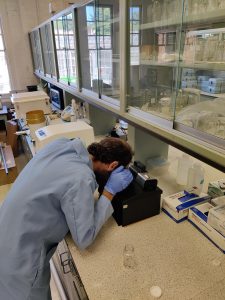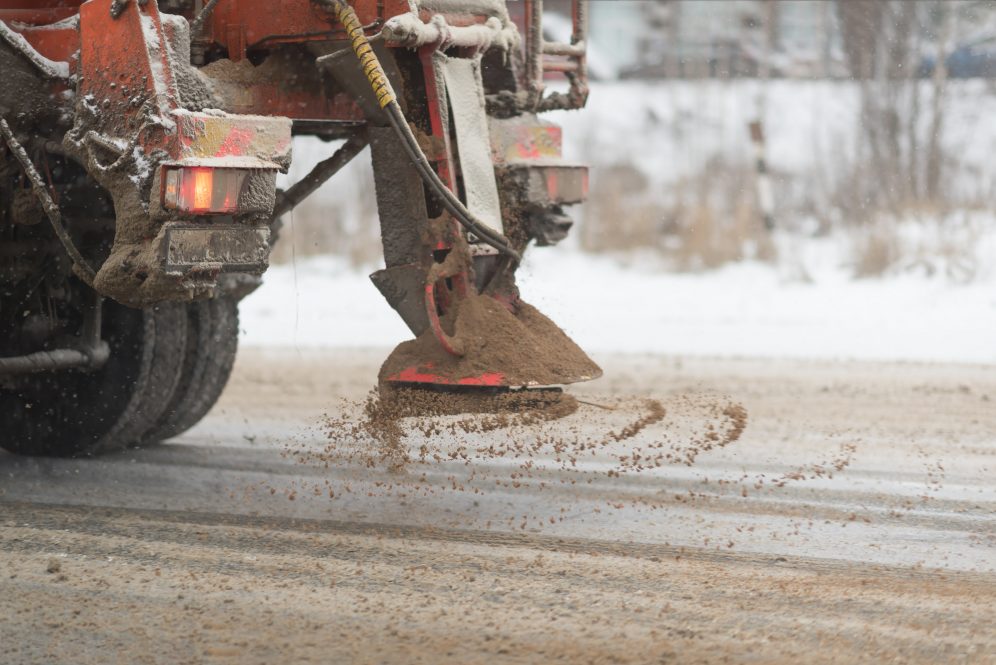Groundwater contamination is a growing problem in Connecticut, and Michael Dietz, the director of the Connecticut Institute of Water Resources at UConn, is working on multiple fronts to address it.
An educator at UConn Extension in the College of Agriculture, Health and Natural Resources Department of Natural Resources and the Environment, Dietz has spearheaded major initiatives to understand and resolve this critical issue in Connecticut and regionally with the help of colleagues at UConn and partners across the state.
One of those initiatives – a small program offering reduced-cost well water testing to homeowners in the state – has received a $350,000 award from the U.S. Department of Agriculture that will allow Dietz to extend the reach of the program in rural communities. Dietz hopes to make the service available to 1,000 homeowners over the two years of the grant, a considerable increase from the 25 homeowners served by the program as of 2021.
“There are more than 300,000 wells in the state, and we want to help these homeowners get testing done so they know whether their water is safe to drink,” says Dietz, who is PI on the project.
The only time testing is currently required in Connecticut is when a well is installed. Dietz thinks more frequent testing is needed due to increasing contamination levels in soil and water. Road salt is a significant source of the contamination, he says, and the rate at which it is applied to roads has steadily increased over the last 40 years.
Two other elements – arsenic and uranium – have also been found in Connecticut’s groundwater. Uranium, which occurs naturally, can cause cancers and other health issues in high concentrations. A recent study by the U.S. Geological Survey determined that some well water samples exceeded the EPA’s maximum contaminant levels for these elements.
There are more than 300,000 wells in the state, and we want to help these homeowners get testing done so they know whether their water is safe to drink. — Michael Deitz, director of the Connecticut Institute of Water Resources
Recent research by Dietz’s co-PIs on the project, Professor Gary Robbins at UConn and Professor Meredith Metcalf at Eastern Connecticut State University, identified the historic use of lead arsenate pesticides in apple orchards as a possible source of the arsenic. Robbins has been doing research and working with Connecticut communities on groundwater issues for more than 35 years.
Reducing the use of road salt is an overarching water quality concern that Dietz and Robbins have been working on for years. The deicing salts used on roads, walkways, parking lots, and driveways in the winter to prevent slips and falls, contain sodium chloride and other chemicals that run off surfaces or slowly permeate them, eventually making their way into the soil and water and affecting vegetation, aquatic life, and human health when it reaches drinking water wells.
As part of an effort led by the Connecticut Training and Technical Assistance Center (T2 Center) at UConn, Dietz served on a committee with several state and local agencies, including the Department of Transportation, Department of Energy and Environmental Protection, the Department of Public Health (DPH), and public works officials in South Windsor looking at ways to cut road salt use and the resulting harm to the environment while maintaining pedestrian and driver safety. Modeled after a program in New Hampshire, the “Green Snow Pro” program is now being offered around the state by the T2 Center.
After the program was piloted at UConn with facilities staff, Dietz used monitoring data to confirm that the salt reductions improved water quality and saved money. In 2022, a bill, S.B. 240: An Act Concerning the Use of Sodium Chloride to Mitigate Snow and Ice Accumulations, was passed in the state legislature to lessen the effects of sodium chloride contamination in private wells and public drinking water supplies. The legislation provided funding for the T2 Center to expand trainings to private snow contractors in the state. Dietz noted that the progress being made on the issue could not have happened without the work of partners at many agencies and organizations.

The USDA-funded well-testing program, titled The Rural Private Well Testing and Citizen Education Program, grew out of that work and is modeled after a similar well-testing program in Virginia. That program consists of a series of educational workshops, where homeowners have an opportunity to sign up for well-testing at a later date. The program subsidizes the cost of the well-testing, which can be substantial.
Dietz is planning workshops in Connecticut this winter with the goal of enabling 1,000 homeowners in 13 rural communities to have their well water tested free of charge. The towns targeted for testing are in rural areas of northwest and northeast Connecticut, although Dietz hopes to expand to other suburban towns whose residents are primarily served by private wells. While 1000 homes represent a fraction of the residential wells in Connecticut, Dietz says it’s a start.
The program complements a private well program at DPH, which provides information about groundwater contamination but lacks the staff to test water from wells. Dietz says he and Robbins have been working with DPH for a number of years. When the grant opportunity came up, it seemed like the perfect way to expand on that effort, Dietz says.
“This is a really strong extension project that is about helping people,” he says. “That’s what extension does. That’s what we’re all about.”



